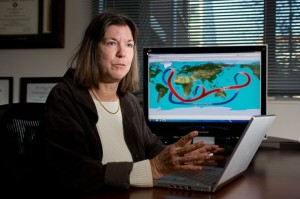The extreme scenarios put forth at the New York climate summit continue to be revealed as fantasy. A new research paper concludes that climate sensitivity to CO2 is far less than the UN proclaimed.
The prolonged failure of global temperatures to behave as UN IPCC computer models project is a major embarrassment for the global warming campaign.
Climate researchers Nicholas Lewis and Judith Curry have just published a new paper in the journal Climate Dynamics,
A press release from the Global Warming Policy Foundation states:
Earlier this year, in a widely discussed report for the Global Warming Policy Foundation, climate researcher Nic Lewis and science writer Marcel Crok put forward a new estimate of the Earth’s climate sensitivity based on observational data, finding that it was much less alarming than suggested by computer simulations of the Earth’s climate.
Now, Lewis and well known American climate science professor Judith Curry have updated the Lewis and Crok report estimates using the latest empirical data, a more sophisticated methodology and an approach to accounting for uncertainties that has been described by one independent reviewer as “state of the art”. Their findings fully support the modest estimates of climate sensitivity and future warming given in the Lewis and Crok report, and compared with that report make it look even less likely that the substantially higher estimates based on computer simulations are correct.
It is fundamental to the scientific method that a researcher’s hypothesis, no matter how much they may like it, must yield to real world observational data. When the model and the data disagree, it is the model that must change.
If th e sensitivity of the Earth’s climate to CO2 is much smaller than UN models claim, everything we have been repeatedly told about climate science is exaggerated and provides no basis for sound energy policy.
e sensitivity of the Earth’s climate to CO2 is much smaller than UN models claim, everything we have been repeatedly told about climate science is exaggerated and provides no basis for sound energy policy.


Let me guess, you get your funding from a lsrge oil company.
You’re as wrong on that as you are in denial about what the actual temperature of the world has been. Keep exhaling, maybe you’ll get lucky.
Why do the Global Warmi….. ooops…. Climate Change lemmings always name anyone not goose stepping with them agents of lsrge(sic) oil companies.
No Stephan it’s just math!
Total Cfact revenues over the past 3 years have averaged around $3
million, as reported on the organization’s IRS Form 990 and its most
recent annual audited financial statement. As of 2013, it had a 3-star
(out of 4) rating from Charity Navigator and a 4-star (out of 5) rating
from GuideStar.
Let me guess, Stephan. You can’t read a graph for facts.
Isn’t the UN totally incompetent in everything they attempt to do?
They are not incompetent, they are corrupt. The poor countries of the world view the UN as a potential Sugar Daddy, whom they can guilt into pity payments for bureaucrats and political operatives, and where they can rant about the incivility of the West while demanding the West’s wealth and technology.
Saw this when they changed the name to “climate change”.
Well, finally, someone has it right. Climate sensitivity or the influence of C02 on climate is almost negligible.
Any nitwit, after seeing no budge in global temperatures for the past 20 years despite the fact that one half of all C02 produced by man has occurred in this time, would come to the obvious conclusion that C02 has a negligible influence on climate.
Taking it one more step, the physics department at Princeton University has long said that C02 has NO, as absolutely zero influence on climate. This is because as C02 rises other factors, such as watert vapor eliminate any influence C02 might theoretically have on climate
This new mind set will probably be devastating for members of the fanatical church of global warming. My advice to these morons is – get used to it. Global warming/climate change is complete and total nonsense.
I would like to know who that is at Princeton. Being there you would never know the physics dept. said that. As they have 2 of their finest working on how to bury co2. Cetainly if Princeton wasn’t on board this climate train, the track would come to an end a lot sooner.
You know that water vapour IS ALSO A GREENHOUSE GAS!
Jeez, if you are going to cite basic physics you have to get it right.
Actual cloud cover has a mixed effect with high clouds net absorbing heat and lower clouds both absorbing or reflecting depending on local conditions.
Oh, come on now — look at the blue and green plots. Notice how they’re upward sloping until about 2008, but then reach a plateau? The answer is obvious; it’s because Obama was elected in 2008, and he brought the temperatures under control. Remember, he got bin Laden too. Awesome power. The man is so amazing. Time to climb on my unicorn and ride over the rainbow now…
There is no citation for that graph and it does not come from the paper. Without a source it may as well be made up.
Sadly this analysis of the paper is wrong.
The paper does not reevaluate CO2 forcing. Read the papers title and abstract. It says nothing specifically about CO2 forcing. CO2 forcing is a well established fact that you can measure in a laboratory.
The paper is talking about a reevaluation of TOTAL forcing which included many factors. That is why it spends so much talking about things other than CO2.
Later research published by NASA (https://www.nasa.gov/feature/goddard/earths-recent-history-key-to-predicting-global-temperatures) showed that the lower forcing observed was due to higher than estimated sulphate aerosols in the atmosphere. However as sulphates are being eliminated from dirty fuels, then over time they will be washed out of the atmosphere and their cooling effect will disappear. So the forcing will increase as the sulphates disappear.
As an aside the NASA paper was also also then widely misrepresented as this explanation deftly demonstrates
https://youtu.be/PrNmq4ouWww
So this article has misrepresented the paper it cites and arrived a faulty conclusion.